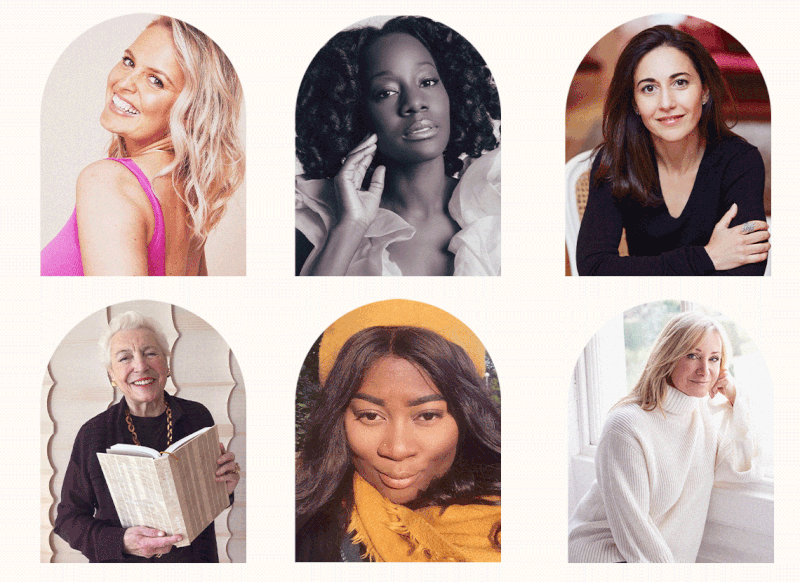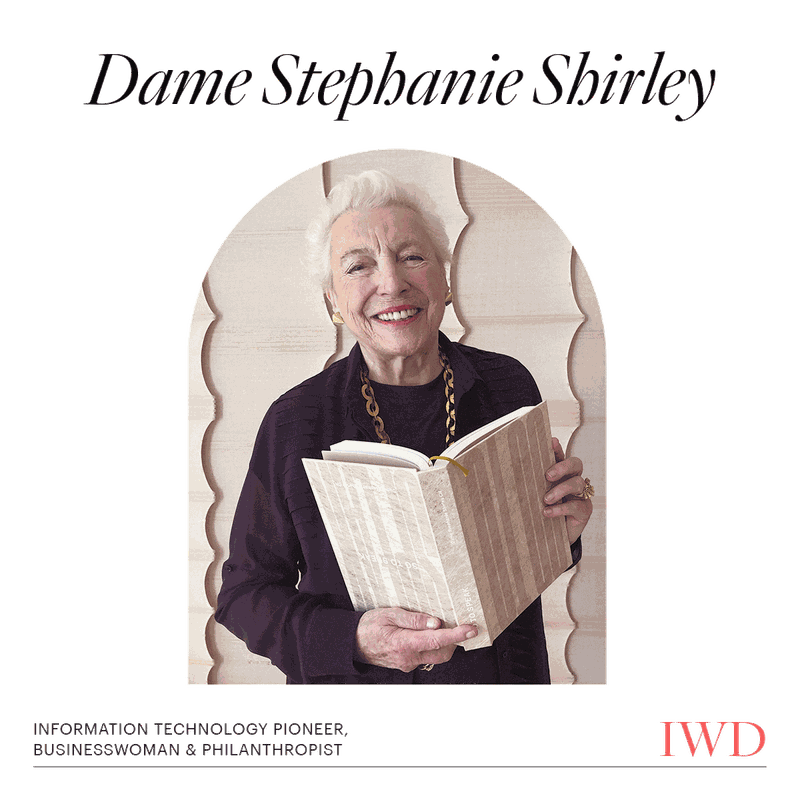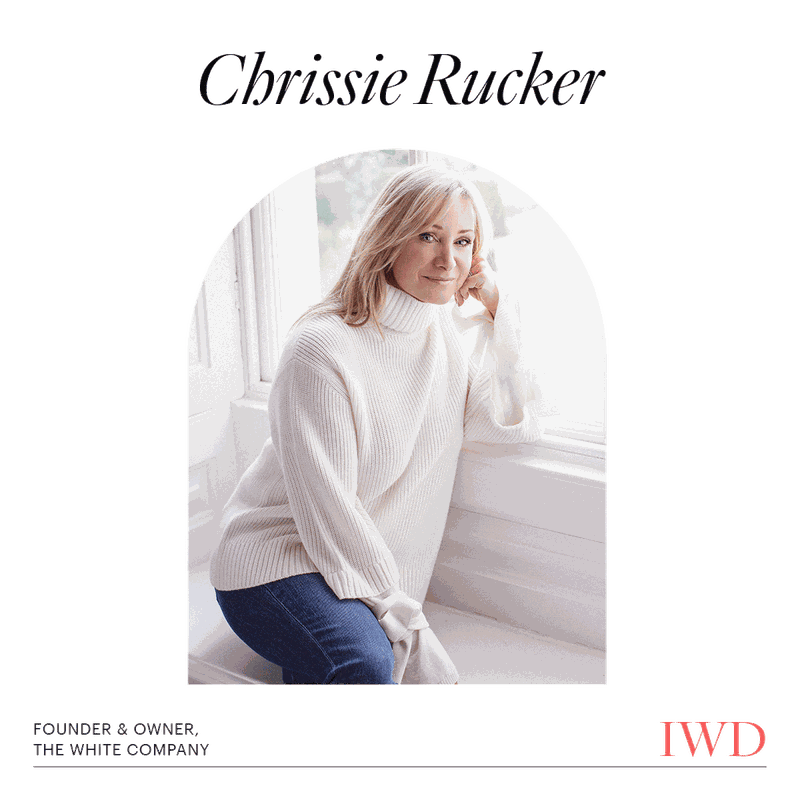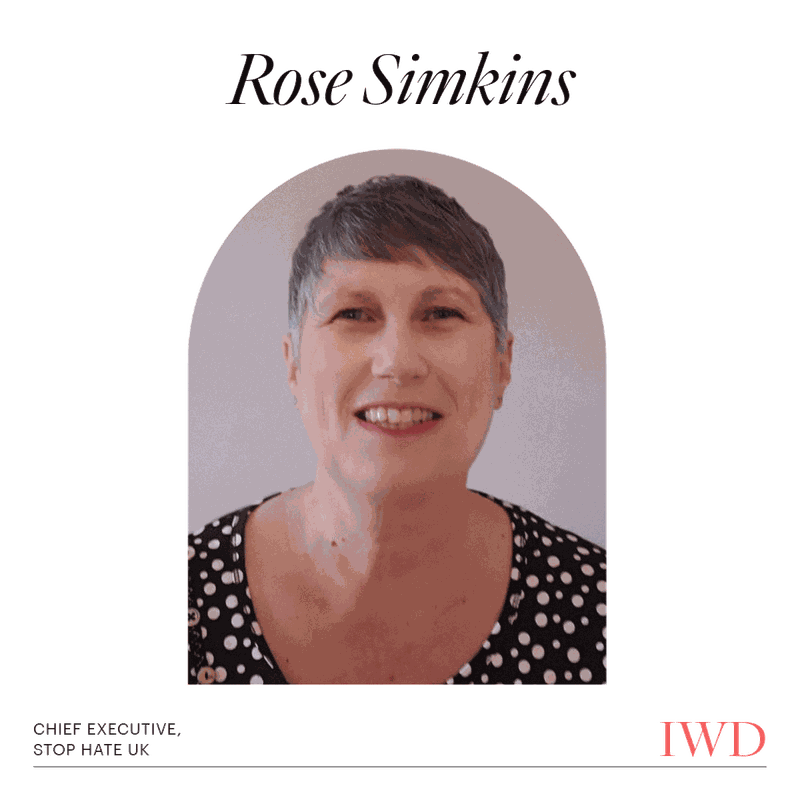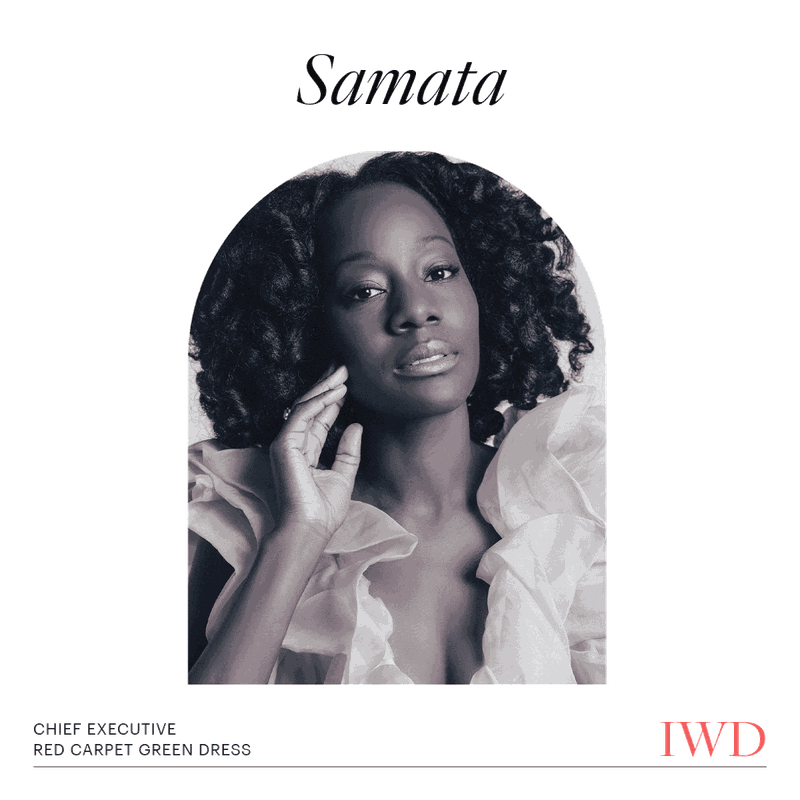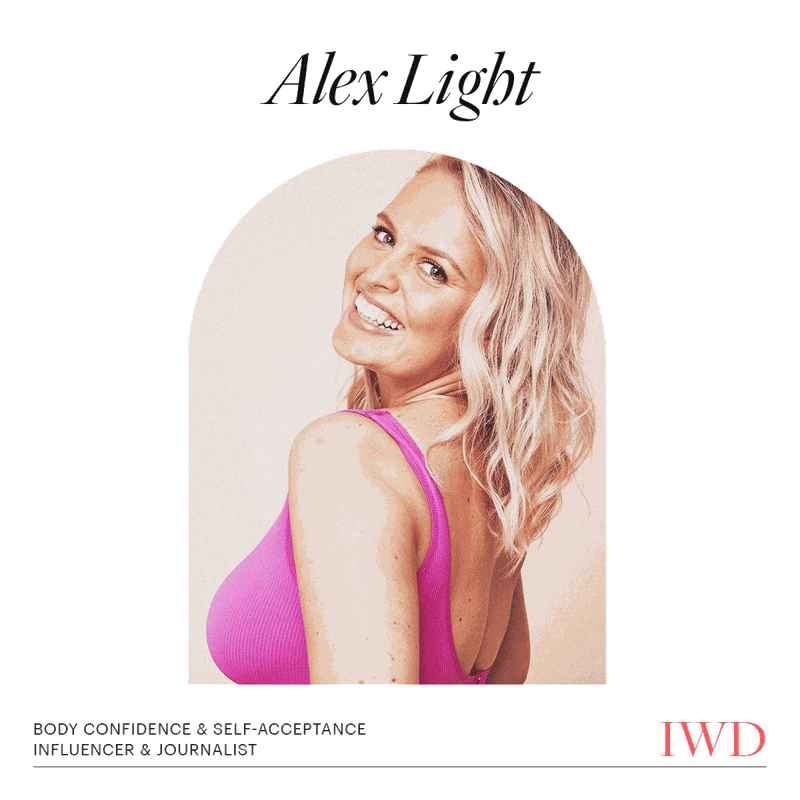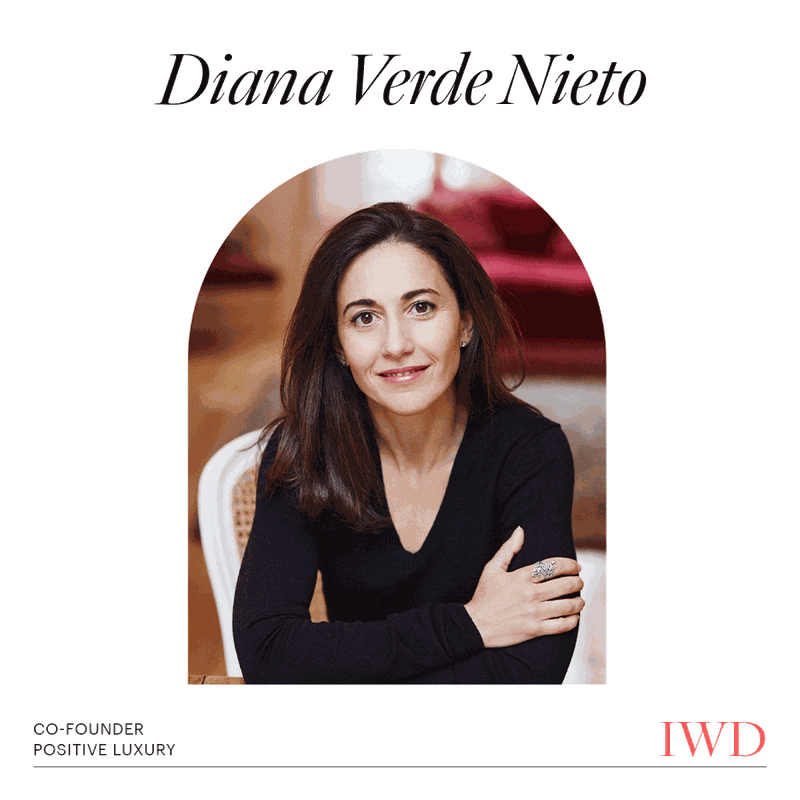10 Women Share What International Women’s Day Means To Them
87-year-old Dame Stephanie credits her life’s success to her wartime upbringing. Having built a software business for women in the early 60s, she went on the sell the company in 2007 – making 70 of her employees millionaires and amassing a personal wealth of more than £150m. She now dedicates her time to charitable endeavours and funding critical research projects.
It was my challenging start in life that drove my success. I came to England eight weeks before the start of WWII as an unaccompanied child refugee on a Kindertransport train from Vienna. The need to prove mine was a life worth saving is as strong today as it was 80 years ago.
As for #ChooseToChallenge, Freelance Programmers embodies it to the letter. It was the software house I set up in the 1960s for women working from home – something that’s now so normal. Let’s just say I like to make new things happen. Now, having been involved with research for many years, my mission is focused on pioneering projects – never more of the same. My satisfaction comes from making a strategic impact, by which I mean working on projects that make a significant difference in an area of need.
My biggest personal challenge still comes from my gender. Having been patronised as a woman, I try hard not to patronise those whom I am able to help. That can be with money. But invariably also with time and skills and introductions. My company was set up to provide professional opportunities to women at a time when women were second-class citizens. People laughed at my dream of a software house for women.
There have been two big challenges in the past year. First there is my husband’s declining health – we have been married for 61 years after an epic courtship of six years. Fortunately, I can afford to employ care staff, but it’s not easy. Meanwhile, my biggest philanthropic challenge, and also the largest project (£30m and five years of my life) has been to set up Prior’s Court residential school for autistic pupils aged five to 25. My late son suffered from the condition, so it’s a cause close to my heart. And – like everyone else – Covid-19 stopped many of my current activities.
When I was first described as disruptive, I thought people were being rude. But that’s what my aim is: change the status quo, leave a legacy of “I made that happen” and enjoy the intellectual challenge of working alongside stimulating people with different skills and experience. This year I’ve funded a scholarship at the Oxford Internet Institute and some work at the National Museum of Computing based at Bletchley Park coding centre involving a group of autistic trainees. I’m also enjoying myself commissioning contemporary art for various non-profits: the IT Livery Company in the City, London’s Foundling Museum for children at risk of abandonment and more than a dozen universities.
Copies of Dame Shirley’s books can be bought via SteveShirley.com. Her TED talks can be viewed here and here. You can also find out more information about Prior’s Court here.
Chrissie Rucker founded The White Company back in 1994, earning an MBE in 2010. She is also the founding patron for The Change A Girls Life Campaign at The Prince’s Trust. Here she tells us more about what this International Women’s Day means to her, and the work she hopes to continue doing…
The past year has been unbelievably challenging for so many people. I’ve been incredibly lucky to have the support of my family, friends and mentors, but not every woman or young girl has had this. For the vulnerable young women who reach out to The Prince’s Trust, life has been harder than ever. They have faced enormous challenges, including domestic and sexual violence, long-term unemployment, bullying, homelessness, single parenthood or simply having no emotional support at home.
I’m #ChoosingToChallenge through The Change A Girl’s Life Campaign. More than 70 brands have come together to support the campaign this International Women’s Day, aiming to raise funds to provide more help to nurture, empower and inspire young women to build their own futures. At The Prince’s Trust, they can find support to re-build lost confidence, gain new skills and move forward into a job, go into further education or become self-employed. They can also work with a mentor – it’s incredible to see the difference it can make.
Remember, good can always come out of challenging times. As women, we’ve become far more agile and entrepreneurial over this past year, with many of us juggling home schooling with full-time work. Even so, we shouldn’t forget that young women in the UK are still disproportionately disadvantaged to young men. This was the case pre-Covid-19, and it’s an inequality that’s been exacerbated by the pandemic. For example, 78% of the job losses at the start of the crisis were female, with two-thirds aged 18-24.
Women have the potential to challenge the status quo at every level. We are a nation of men and women and when we work together, it’s incredibly powerful. The Change A Girl’s Life Campaign for Women Supporting Women at The Prince’s Trust aims to help in a number of ways. To raise funds to support more young women to have access to the free courses at The Princes Trust; to help by sharing our stories and inspire more young women on what is possible; and to enable access to mentorship, further education and support into employment. It is about giving young women the tools, opportunities, support and confidence to know what they can achieve.
Discover the products created for IWD at #ChangeAGirlsLife on Instagram and visit Princes-Trust.org.uk/women to learn more about Women Supporting Women.
Having spent her career working with organisations tackling poverty such as Tearfund and Landmark Training, in 2018, Emma Revie became the chief executive the Trussell Trust, which supports a network of over 1,300 food bank centres across the UK.
During the first six months of the pandemic, our network distributed a record 1.2m emergency food parcels – with 2,600 of those parcels going to children every day on average. After 10 years of cuts to social security and a global pandemic, more people than ever have been pushed into extreme poverty. On a daily basis, food banks across the UK are rising to this unprecedented challenge with compassion and care, but we can’t allow food banks to become part of the fabric of our communities. It’s time for change.
Supporting the rising need at food banks has been the biggest challenge of the past year. Even before the pandemic, there had been a huge surge in need across our network. That said, the impact of coronavirus was instantaneous. Food banks in the Trussell Trust’s UK network saw a 47% increase in need during the first six months alone, making it the busiest ever half-year period. It showed us people were losing their jobs almost immediately – and there was no safety net.
Personally, I’ve found it difficult leading organisations while raising a family. When my children were very little, this was a daily struggle – trying to ensure I was spending quality time with them while also doing my job well. As is the case for many people, I spent a lot of time feeling guilty and like I was failing. Now my boys are older, I can look back on those early years with a lot more kindness towards myself.
This International Women’s Day, I #ChooseToChallenge by speaking up for people in need. In 10 years' time, I want to know the mass distribution of emergency food is a thing of the past. I’ll also continue to work with my colleagues at the Trussell Trust, both locally and nationally, to tackle the issues driving food bank use, like problems with the benefits system and a lack of support services. Our goal is ambitious, and we can’t get there alone – by working together, we can create a better future and end the need for food banks.
You can visit TheTrussellTrust.org for more information about how to support food banks and fight hunger and poverty in the UK. You will also find more details of the Hunger Free Future campaign there. Alternatively follow @TrussellTrust on Instagram and Twitter.
As the founder and CEO of Compliments of The House, Sinéad Browne runs a registered food redistribution charity that collects and redistributes fresh surplus food to those in need.
My current role is definitely challenging to say the least. Beyond minimising food waste and opening our hubs all across Britain, my aim is for our hubs to be as common as a Tesco Express. My mission is also about trying to make charity work feel modern and sexy, so more people engage with it. In the past year, we’ve been forced to reorganise the service we are able to offer. It was no mean feat, but we were able to go from a collection service to a delivery service in a matter of weeks, which meant we could support hundreds of individuals and families in need.
As a charity, we want to provide an alternative way to distribute commercially cooked food. For whatever reason, people view cooked food as ‘already used’, meaning that if it isn't purchased by the end of the day, then it’s discarded. Food banks do an amazing job, as do soup kitchens, but there’s not always the need to cook more food when there’s already so much ready to be redistributed to those in need.
Today, challenge and change are happening within the community. Each generation learns from those before them and takes their own experiences and matches them with the latest resources to buck the status quo. Ultimately, one of the biggest challenges we face is getting people to understand that charity is synonymous with community.
Losing a baby has been my biggest personal challenge. I felt like I had failed at the one thing that I was built to do. In that moment, I felt as if I had lost my power as a woman. The miscarriage happened on a shift at the hub during an altercation with a guest, so it felt very public and intense. It made me question who I was, what the loss meant and even my relationship with the charity. Thankfully I came to terms with it and eventually found a way to make my peace with it.
It’s also extremely challenging being a young Black woman with a vision. Even more so when you’re from an impoverished background – you have the experience to fix a certain issue but lack the “correct” voice to be heard. Forget about getting a seat at the table when you can't get access to the building. It’s why, this International Women’s Day, I #ChooseToChallenge by being myself and owning who I am: a young Black female CEO from south-east London.
For more information on Compliments of The House and the work they, and Sinéad, do, visit ComplimentsOfTheHouse.org.
A self-confessed ‘boldness junkie’, Anna Baréz-Brown founded Shine For Women with Caroline Whaley in 2013, with the aim of delivering confidence and connections for female leaders, whether it be as individuals, teams or companies.
When we co-founded Shine for Women, we set out to make business more human. Our overarching goal is to create an equal playing field for men and women and increase empathy in organisations. We believe it’s what drives better business results. At Shine, we specialise in gender equality, diversity and inclusion and work with men and women to create cultures where everyone feels they belong.
This International Women’s Day, every woman should #ChooseToChallenge their own personal development. She should take things into her own hands and play a bigger game both personally and professionally. We believe in the empowerment of women, and the need to create a truly human environment. When women thrive, men thrive, and businesses thrive.
These days, women have a massive opportunity to create a world we truly want to live in. We have to understand who we are, what positive impact we want to create, and to go for it together – not alone. Don't accept what you don't like. The biggest challenge women have felt throughout the pandemic is not to beat themselves up. Acceptance and self-love are critical for success.
In order to challenge the status quo, you need four things. Authenticity, which means understanding your personal values and beliefs. Authority, developing your expertise, and staying current in your industry to have a seat at the table. Agility, learning when to express yourself in a way that works and develops your resilience. And activity – get out there and take action.
For more information on Shine For Women, visit Shine4Women.com. SheerLuxe readers can also enjoy a free trial of the Shine On app by clicking here.
Rose Simkins is currently chief executive of Stop Hate UK, a leading national organisation working to challenge all forms of hate crime and discrimination, based on any aspect of an individual’s identity.
Throughout my life I never imagined I would end up in this position. In my formative years, girls were generally not encouraged to have a career. As part of a loving, but poor family, much of my childhood was spent on free school meals and we lived on a council estate. But I went on to university and started my career in housing management and homelessness work. From there, I moved onto to Asylum and Refugee support, and eventually ended up at Leeds Racial Harassment Project (which is now Stop Hate UK).
One of the biggest challenges we face as women is believing in ourselves. Women of my age were influenced by the typical image of femininity in the 1950s. We were meant to be homemakers and mothers. I was challenged by a friend’s parents on my decision to pursue A-levels and a degree – sadly; some people thought it was all a waste of time and money. When my children were young, it was still the norm for women to ‘park’ their career. But I was determined to do both.
I’m not someone who will ever accept that things are always done a certain way – especially if I feel change can happen. Over the years, I’ve worked with people who want to see the ‘manual’, or the ‘rule book’, but having started both the Asylum Project and Stop Hate UK from nothing, I now know we have to make the rules ourselves. Throughout my career, I have always looked to surround myself with brilliant people and, by doing this, we can all #ChooseToChallenge.
We can all help to make the world a safer, happier place. A great example is the advice I give my own helpline team: “If, at the end of a call, someone feels better than at the beginning, then this is a great start.” We have a huge and urgent job to do, which is massively underfunded, so we need to keep pushing and challenging to ensure the work we do carries on and more people can feel supported and not forgotten.
Visit StopHateUK.org to find out how you can get involved, as well as more information about the next National Hate Crime Awareness Week, which takes place between 9th-16th October 2021.
A British-born Ghanaian, Samata is currently the chief executive of Red Carpet Green Dress, an organisation founded by Suzy Amis Cameron, which showcases sustainable fashion at the Oscars every year.
Within the fields I work in, I’ve committed myself to creating positive change wherever possible. At RCGD, it’s our goal is to draw attention to the importance of more sustainable practices in fashion and be part of bringing those solutions to the global market. We want to reach as many people as possible to bring sustainability to the forefront of the conversation – it’s so important given the amount of waste the industry produces each year.
Making positive change often comes with its challenges. As a female CEO, I know first-hand how society can question our capability. It’s incredibly important to #ChooseToChallenge and remain relentless in building self-belief. I will always be an advocate for making women feel good about who they are and what they do – building one another up regardless of race, religion, age or orientation is the number one way to empowerment.
It’s fair to say 2020 exposed multiple weaknesses in the status quo. The pandemic arguably helped to expose systemic inequalities and structural racism, which came to light globally through the Black Lives Matter movement. It highlighted the change that needs to be made. It felt like a powerful time, but it was also challenging to accept that we have such a long way to go before there’s any kind of equality within society. As a female Black CEO, I’m fortunate to have been given a platform to voice my opinion.
To find out more about Red Carpet Green Dress, including its brand collaborations and youth initiatives, visit RCGDGlobal.com.
Having struggled with an eating disorder for most of her 20s, Alex Light decided to transform her virtual platform from a fashion and beauty blog to a place to document the personal struggles she experienced with body image. She now has more than 337,000 followers on Instagram.
It’s my mission to help as many people as possible feel better about their bodies. Too many of us – women in particular – hate the skin they’re in, as a result of a diet culture-obsessed society that encourages us to see our bodies as something to be fixed. Today, and every day, I #ChooseToChallenge that narrative and open up people’s eyes to the beauty outside of what we’ve been told, historically, is beautiful.
Overcoming diet culture is a challenge most women have no choice but to face. I grew up, as many of us did, in an environment where it was heavily reinforced, and it played a huge part in my development of an eating disorder. Overcoming that was the best thing I’ve ever done, but also the most difficult.
Like most people, my mental health has been a struggle over the past year. With our routines having been taken away, as well as our support systems, and being forced to handle a lot of anxiety – it’s all taken a toll. I’m one of the lucky ones but staying positive has still been hard.
In my work, I hope to ease the pressure bearing down on women’s shoulders – it’s constrained us for far too long and prevented us from achieving the things we should be achieving. Diet culture is incredibly pervasive and insidious, and it shows up in our lives in subtle ways we don’t even realise. It’s been difficult to eliminate it from my life entirely, but it has been liberating – I want that for others, too.
You can follow Alex on Instagram and Twitter @AlexLight_LDN. For more support with an eating disorder, visit BeatingEatingDisorders.org.uk.
Diana Verde Nieto co-founded Positive Luxury in 2012, with the aim of helping luxury brands adapt to the new sustainability economy. The company also established The Butterfly Mark, an industry-leading certification that highlights luxury businesses that are committed to making a positive impact on people and the planet.
The pandemic has been challenging for me professionally and personally, but so many women have it so much worse. Women have had to pick up the slack on things like housework and childcare and they have been more affected by job losses. The rise of domestic abuse throughout lockdown has been especially chilling and I hope more is done to make sure anyone who suffers from abuse can find safety and support.
Running my own business has enabled me to avoid some of the worst challenges faced by women in the workplace. Of course, I’ve experienced the same sexist-based challenges every woman does day to day, but being independent has probably shielded me from the worst of it.
The most powerful way we can challenge the status quo is to be the change that we want to see. This International Women’s Day, it’s important to remember to push myself to build the most diverse and inclusive workplace I can. I #ChooseToChallenge by promoting and supporting women at all levels of the organisation. Actions like this have a ripple effect – empowered women empower women.
Visit PositiveLuxury.com, where you find out more about the company’s business predictions for companies and sustainability for 2021.
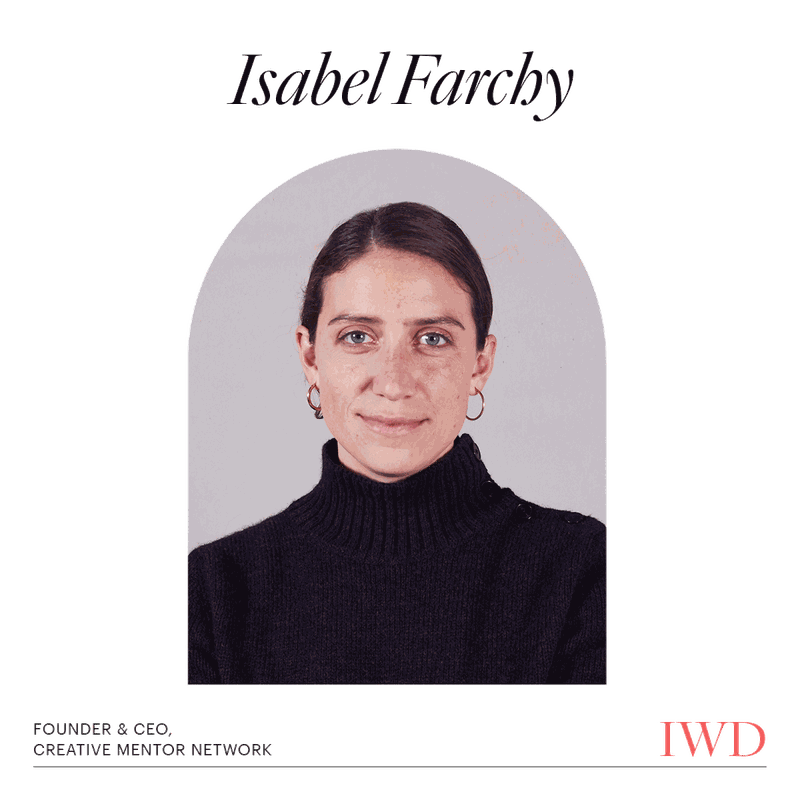
Having started her career in teaching, Isabel Farchy went on the found the Creative Mentor Network in 2015. The organisation matches young people aged 16-25 from a diverse range of backgrounds with mentors to help them maximise career opportunities in the creative industries.
As CEO at Creative Mentor Network, it’s my job to design programmes which will have an impact on young people's lives. I essentially set up the charity because I wanted to create a mechanism that allowed young people from less privileged backgrounds to make connections and build their own networks. People from lower socio-economic backgrounds are not fully represented in the creative workforce – and we #ChooseToChallenge that. My favourite part is seeing the amazing things they go on to achieve.
Our mentoring programmes are designed so everyone wins: young people find career opportunities, employees benefit from training, and businesses access diverse talent. Our ambition is to open up the creative industries so that all young people, irrespective of their start in life, can access creative opportunities. So that someone's ability to get the job they want isn't dictated by how well connected their parents are or which school they went to, but by the quality of their ideas and how hard they work.
Creative Mentor Network has been such a personal challenge, because I set it up from scratch. I ran the very first pilot with my students, matched them with mentors who were my friends and led the training sessions myself. I applied for lots of funding but was never successful early on, so I didn't have any money to start the project – I did it alongside my job as a teacher for the first three or four years.
As the organisation has grown, the challenges have changed. For instance, I now work alongside much more senior stakeholders. My biggest challenge now is self-confidence. In a room full of very senior people, I often struggle to voice my opinions. I have to remind myself that I have ten years of experience in education and young people, and that my perspective is valuable.
2020 was one big challenge for everyone. Lockdown initially meant a huge number of our planned programmes got cancelled, so our young people lost out on programmes that could have really helped during school closures and the Black Lives Matter movement. Despite the stresses, there were also a lot of positives. We've moved our programmes online so we're now in a much better position to scale and offer support to young people outside of London.
To be successful, we all need to be able to traverse and challenge the existing social boundaries. Through Creative Mentor Network I want to challenge people to think about how positive it can be to work with people who add to the company culture instead of choosing those who just fit in.
Visit CreativeMentorNetwork.org to find out more about the mentor development programme and diversity training for small businesses.
For more information about International Women’s Day and the #ChooseToChallenge campaign visit InternationalWomensDay.com, where you will be able to find a host of resources, as well as information on donating to some worth causes. Alternatively, follow @InternationalWomensDay_Global on Instagram, as well as the hashtag #IWD2021
DISCLAIMER: We endeavour to always credit the correct original source of every image we use. If you think a credit may be incorrect, please contact us at info@sheerluxe.com.
